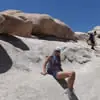3. See the Signs
Prevention is always the best method when it comes to winter dehydration, but it's even more important to know what to do if someone does become afflicted. Some common signs to look for include:
- Fatigue
- Dry mouth
- Minimal urine output
- No tears
- Dizziness
- Muscle cramps
If you, or someone you're traveling with, exhibit these signs, stop trekking immediately. The worst thing a dehydrated person can do is over-exert themselves to finish a hike or make it to camp. Stop on the side of the trail to rest and drink water.
More: 5 Dog Safety Tips for Winter Hikes
When rehydrating, keep in mind, "It is better to drink small amounts of fluid often (using a teaspoon or syringe for an infant or child), instead of trying to force large amounts of fluid at one time. Drinking too much fluid at once can bring on more vomiting," as recommended by Drugs.com.
Winter dehydration is very common, and should be considered as you hike and camp deep in the snowy wilderness. Focus on prevention, but be aware of how to rehydrate and rest if you, or someone you're with, does become dehydrated.
More: 5 Convincing Reasons to Camp in the Winter
 Find a Campground at ReserveAmerica.com.
Find a Campground at ReserveAmerica.com.



